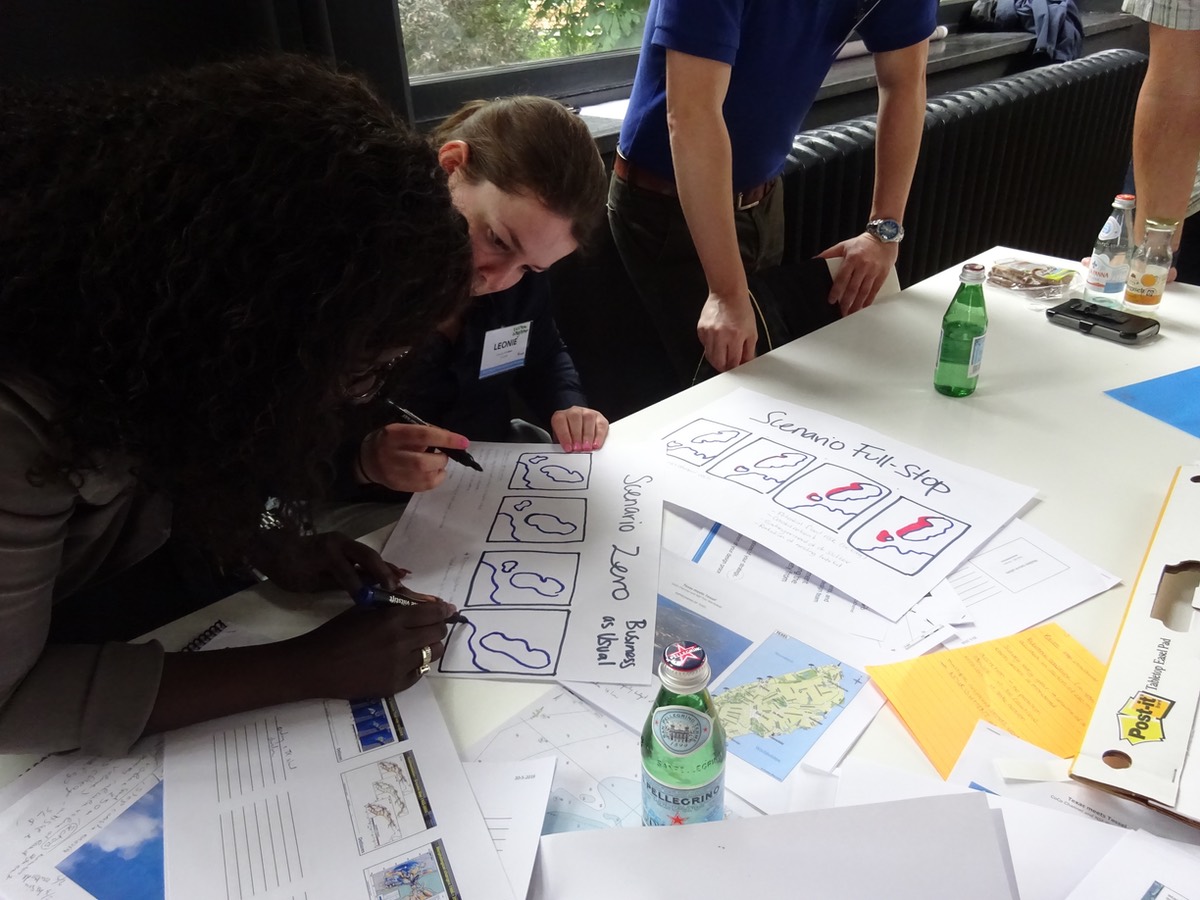Educational experiences
Downloads
DOI:
https://doi.org/10.47982/rius.7.129Keywords:
Engineering roles, interdisciplinary ways of learning, Building with Nature design, authentic learning experiencesAbstract
Building with Nature (BwN) infrastructure designs are characterised by disciplinary integration, non-linearity, diverse and fluid design requirements, and long-term time frames that balance the limitations of earth’s natural systems and the socio-technical systems created by humans. Differentiating roles in the engineering design process may offer strategies for better solutions. Four complementary engineering design roles were distinguished, namely: Specialists, System Integrators, Front-end Innovators, and Contextual Engineers. The key research question addressed in this paper asks, how can the introduction of engineering roles enhance interdisciplinary processes for BwN design? Three Building with Nature design workshops with international groups of students from multiple disciplines and various education levels provided the ideal context for investigating whether engineering roles enhance such interdisciplinary ways of working. Results indicate that the application of engineering roles in each of the three workshops indeed supported interdisciplinary design. A number of conditions for successful implementation within an authentic learning environment could be identified. The engineering roles sustain an early, divergent way of looking at the design problem and support the search for common ground across the diverse perspectives of the team members, each bringing different disciplinary backgrounds to the design table. The chapter closes with a discussion on the value of engineering design roles and their significance for the Building with Nature approach.
How to Cite
Published
Issue
Section
References
Beers, P.J. (2005). Negotiating Common Ground: Tools for Multidisciplinary Teams (Doctoral dissertation). Open University. https://www.ou.nl/documents/40554/111685/BeersPJproefschrift_2005.pdf/11132275-502c-448b-ad50-468b9659f1c7
Boix-Mansilla, V. (2010). Learning to Synthesize: The Development of Interdisciplinary Understanding. In C. Mitcham, J. B. Holbrook, J. T. Klein, & R. Frodeman (Eds.), The Oxford Handbook of Interdisciplinarity (pp. 288–306). Oxford University Press.
Cunningham, S. W., Hermans, L. M., & Slinger, J. H. (2014). A review and participatory extension of game structuring methods. EURO Journal on Decision Processes, 2(3–4), 173–193. https://doi.org/10.1007/s40070-014-0035-8
Fortuin, K.P.J. (2015). Heuristic principles to teach and learn boundary crossing skills in environmental science education (Doctoral dissertation). Wageningen University. https://edepot.wur.nl/356213
d’Hont, F., & Slinger, J. (2018). Application of a co-design process on a nature-based intervention in the coastal system of Texel, the Netherlands. 1-1. Poster session presented at 1st International Conference on Water Security, Toronto, Canada.
Hooimeijer, F., Kuzniecow Bacchin, T., Lafleur, F., van de Ven, F., Clemens, F., Broere, W., Laumann, S., Klaassen, R., & Marinetti, C. (2016). Intelligent SUBsurface Quality: Intelligent use of subsurface infrastructure for surface quality. Delft University of Technology. http://resolver.tudelft.nl/uuid:6eff83a8-d0c6-438e-aa42-0dbd03835ac9
Jay, T., Rose, J., & Milligan, L. O. (2017). Adoption, adaptation, and integration: renegotiating the identity of educational research through interdisciplinarity. International Journal of Research & Method in Education, 40(3), 223–230. https://doi.org/10.1080/1743727x.2017.1311478
Jescke, S. (2016, January 22). The role of Higher Education in The Fourth Industrial Revolution. World Economic Forum. https://www.weforum.org/agenda/2016/01/what-role-will-education-play-in-the-fourth-industrial-revolution/
Kamp, A. (2016). Engineering Education in the Rapidly Changing World: Rethinking the Vision for Higher engineering Education (2nd revised edition ed.). TU Delft, Faculty of Aerospace Engineering.
Kamp, A., & Klaassen, R. G. (2016). Impact of global forces and empowering situations on engineering education in 2030. In Proceedings of the 12th international CDIO conference (pp. 1-20). CDIO.
Kothuis, B. L. M., Slinger, J. H., & Cunningham, S. W. (2014). Contested issues game structuring approach-CIGAS workshop Houston report, results and reflection: Exploring stakeholder-based joint commitment to action for flood protection decision-making in the Houston Galveston Bay Area. Bee’s Books.
Kothuis, B. L. M. (2017). Stakeholder value inclusive design: Using the contested issues game structuring approach (CIGAS) in Texas. In B. Kothuis, & M. Kok (Eds.), Integral Design of Multifunctional Flood Defenses: Multidisciplinary Approaches and Examples (pp. 154-157). Bee’s Books.
Kothuis, B. L. M., & Slinger, J. H. (Eds.). (2018). Voices on Sustainable Ports in Africa: Stories from Tema Port, Ghana. Delft University Publishers.
McKenney, S., & Reeves, T. C. (2018). Conducting Educational Design Research (2nd ed.). Routledge. https://doi.org/10.4324/9781315105642
Menken, S. B. J., Keestra, M., Rutting, L., & Post, G. (2016). An Introduction to Interdisciplinary Research. Amsterdam University Press.
Newing, H. (2010). Interdisciplinary training in environmental conservation: definitions, progress and future directions. Environmental Conservation, 37(4), 410–418. https://doi.org/10.1017/s0376892910000743
Raymond, C. M., Breil, M., Nita, M. R., Kabisch, N., de Bel, M., Enzi, V., ... & Berry, P. (2017). An impact evaluation framework to support planning and evaluation of nature-based solutions projects. Report prepared by the EKLIPSE Expert Working Group on Nature-Based Solutions to Promote Climate Resilience in Urban Areas. Centre for Ecology and Hydrology.
Repko, A., Navakas, F., & Fiscella, J. (2007). Integrating interdisciplinarity: How the theories of common ground and cognitive interdisciplinarity are informing the debate on interdisciplinary integration. Issues in Interdisciplinary Studies.
Schwab, K. (2017). The Fourth Industrial Revolution. Reed Business Education.
Slinger, J. (2015, October 8). Building with Nature @ TU Delft 2015 [Dataset]. https://data.4tu.nl/collections/Building_with_Nature_TU_Delft_2015/5065574
Slinger, J. H. (2016, March 29). Engineering: Building with Nature 101x: series of 11 videos [Dataset]. https://data.4tu.nl/collections/Engineering_Building_with_Nature_101x_series_of_11_videos/5065442
Slinger, J. H., Cunningham, S. W., Hermans, L. M., Linnane, S. M., & Palmer, C. G. (2014). A game-structuring approach applied to estuary management in South Africa. EURO Journal on Decision Processes, 2(3–4), 341–363. https://doi.org/10.1007/s40070-014-0036-7
Stentoft, D. (2017). From saying to doing interdisciplinary learning: Is problem-based learning the answer?. Active Learning in Higher Education, 18(1), 51-61. https://doi.org/10.1177/1469787417693510
van den Bossche, P., Gijselaers, W. H., Segers, M., & Kirschner, P. A. (2006). Social and Cognitive Factors Driving Teamwork in Collaborative Learning Environments: Team Learning Beliefs and Behaviors. Small Group Research, 37(5), 490–521. https://doi.org/10.1177/1046496406292938
Voorendt, M. (2017). Design principles of multifunctional flood defences (Doctoral dissertation). Delft University of Technology. https://doi.org/10.4233/uuid:31ec6c27-2f53-4322-ac2f-2852d58dfa05
Waterman, R. E. (2010). Integrated coastal policy via Building with Nature (Doctoral dissertation). Delft University of Technology. http://resolver.tudelft.nl/uuid:fa9a36f9-7cf8-4893-b0fd-5e5f15492640
de Vriend, H. J., van Koningsveld, M., Aarninkhof, S. G. J., de Vries, M. B., & Baptist, M. J. (2015). Sustainable hydraulic engineering through building with nature. Journal of Hydro-Environment Research, 9(2), 159-171. https://doi.org/10.1016/j.jher.2014.06.004
de Vriend, H. J., & van Koningsveld, M. (2012). Building with nature - Thinking, acting and interacting differently. Ecoshape.





